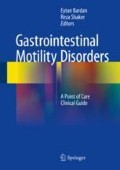Abstract
There are many causes of anorectal pain. This section will focus on three patients in whom chronic or recurrent anorectal pain occurs in the absence of a biologic disease marker. Chronic anorectal pain disorders, proctalgia fugax, and idiopathic tenesmus are all categorized as functional pain disorders and can greatly impair quality of life.
Chronic functional anorectal pain can be divided into levator ani syndrome or nonspecific anorectal pain by the presence of levator tenderness on digital examination in the former but not the latter. There is evidence that some patients with levator ani syndrome may respond to biofeedback or electrogalvanic stimulation. In contrast, there is little evidence for therapy in nonspecific anorectal pain or proctalgia fugax. Treatment for functional tenesmus is based upon the concept that anorectal hypersensitivity occurs on the basis of central nervous system dysregulation with possible contributions by cognitive or emotional centers. Treatment is based upon a biopsychosocial model with emphasis on tricyclic agents which have shown efficacy in functional gastrointestinal disorders such as noncardiac chest pain and irritable bowel syndrome. Management strategies are discussed in the text.
Access this chapter
Tax calculation will be finalised at checkout
Purchases are for personal use only
References
Drossman DA, Li Z, Andruzzi E, Temple RD, Talley NJ, Thompson WG, et al. U.S. householder survey of functional gastrointestinal disorders. Prevalence, sociodemography, and health impact. Dig Dis Sci. 1993;38(9):1569–80.
Rao SS, Bharucha AE, Chiarioni G, Felt-Bersma R, Knowles C, Malcolm A, Wald A. Functional anorectal disorders. Gastroenterology. 2016;130(5):1510–8. pii: S0016-5085(16)00175-X
Grant SR, Salvati EP, Rubin RJ. Levator syndrome: an analysis of 316 cases. Dis Colon Rectum. 1975;18(2):161–3.
Oliver GC, Rubin RJ, Salvati EP, Eisenstat TE. Electrogalvanic stimulation in the treatment of levator syndrome. Dis Colon Rectum. 1985;28(9):662–3.
Billingham RP, Isler JT, Friend WG, Hostetler J. Treatment of levator syndrome using high-voltage electrogalvanic stimulation. Dis Colon Rectum. 1987;30(8):584–7.
Gilliland R, Heymen JS, Altomare DF, Vickers D, Wexner SD. Biofeedback for intractable rectal pain: outcome and predictors of success. Dis Colon Rectum. 1997;40(2):190–6.
Thiele GH. Tonic spasm of the levator ani coccygeus and pyriformis muscle. Trans Am Proctol Soc. 1936;37:145–55.
Rao SC, McLeod M, Beaty J, Stessman M. Effects of botox on levator ani syndrome: a double blind, placebo controlled cross-over study. Gastroenterology. 2004;99:S114–5.
Chiarioni G, Nardo A, Vantini I, Romito A, Whitehead WE. Biofeedback is superior to electrogalvanic stimulation and massage for treatment of levator ani syndrome. Gastroenterology. 2010;138(4):1321–9. doi:10.1053/j.gastro.2009.12.040. Epub 2010 Jan 4
Thompson WG, Heaton KW. Proctalgia fugax. Roy Coll of Phys (London). 1980;14:247–8.
Eckhardt VF, Dodt O, Kanzler G, Bernhard G. Anorectal function and morphology in patients with sporadic proctalgia fugax. Dis Colon Rectum. 2004;39:755–62.
Kamm MA, Hoyle CH, Burleigh DE, Law PJ, Swash M, Martin JE, Nicholls RJ, Northover JM. Hereditary internal anal sphincter myopathy causing proctalgia fugax and constipation. A newly identified condition. Gastroenterology. 1991;100:805–10.
Celik AF, Katsinelos P, Read NW, Khan MI, Donnelly TC. Hereditary proctalgia fugax and constipation: report of a second family. Gut. 1995;36:581–4.
Eckhardt VF, Dodt O, Kanzler G, Bernhard G. Treatment of proctalgia fugax with salbutamol inhalation. Am J Gastroenterol. 1996;91:686–9.
Swain R. Oral clonidine for proctalgia fugax. Gut. 1987;28:1039–40.
Dorn SD, Palsson OS, Thiwan SI, et al. Increased colonic pain sensitivity in irritable bowel syndrome is the result of an increased tendency to report pain rather than increased neurosensory sensitivity. Gut. 2007;56:1202–9.
Tillisch K, Mayer EA, Labus JS. Quantitative meta-analysis identifies brain regions activated during rectal distension in irritable bowel syndrome. Gastroenterology. 2011;140(1):91–100.
Keefer L, Drossman DA, Guthrie E, et al. Centrally mediated disorders of gastrointestinal pain. Gastroenterology. 2016;150:1408–19.
Maradey-Romero C, Fass R. New therapies for non-cardiac chest pain. Curr Gastroenterol Rep. 2014;16(6):390.
Lee H, Kim JH, Min BH, Lee JH, Son HJ, Kim JJ, Rhee JC, Suh YJ, Kim S, Rhee PL. Efficacy of venlafaxine for symptomatic relief in young adult patients with functional chest pain: a randomized, double-blind, placebo-controlled, crossover trial. Am J Gastroenterol. 2010;105(7):1504–12.
Vanuytsel T, Tack JF, Boeckxstaens GE. Treatment of abdominal pain in irritable bowel syndrome. J Gastroenterol. 2014;49(8):1193–205.
Author information
Authors and Affiliations
Corresponding author
Editor information
Editors and Affiliations
Rights and permissions
Copyright information
© 2018 Springer International Publishing AG
About this chapter
Cite this chapter
Wald, A. (2018). Functional Anorectal Pain/Tenesmus. In: Bardan, E., Shaker, R. (eds) Gastrointestinal Motility Disorders . Springer, Cham. https://doi.org/10.1007/978-3-319-59352-4_36
Download citation
DOI: https://doi.org/10.1007/978-3-319-59352-4_36
Published:
Publisher Name: Springer, Cham
Print ISBN: 978-3-319-59350-0
Online ISBN: 978-3-319-59352-4
eBook Packages: MedicineMedicine (R0)

